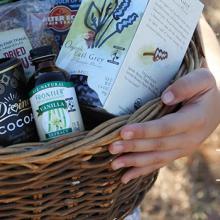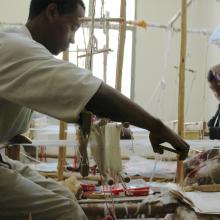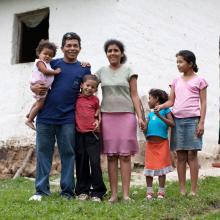Fair Trade
Today, believers can strive to keep their priorities consistent with their dress. Before purchasing a Jesus T-shirt, wearers should consider if the garment was made under safe and fair working conditions. Believers can use their voice to pressure beloved clothing brands to respect the dignity of garment workers, through living wages and good working conditions. Believers can also wear clothes that reflect the dignity of the earth, choosing clothes from eco-conscious brands, or just by buying second-hand.
Valentine’s Day is the day of romantic love. If we take our cues from advertisements, it’s an opportunity to purchase and consume flower bouquets, candies, chocolate-covered strawberries, and frilly negligees — gifts we bestow upon our beloveds to show the depths of our love. But many of the gifts we give on Valentine’s Day are made available for our consumption through the exploitation of others; they convey romantic love at the expense of love of neighbor.

suradach / Shutterstock.com
The narrative of a retail event like Black Friday weekend is broken.
What if we could embrace a new narrative? What if that new narrative is really an old narrative just seen with new eyes?
This weekend, the global church is starting Advent, which is a time of preparation for the coming of Jesus. However, we live in a world where Jesus has already entered. How should our lives look different in response to that and as a church be part of bringing the kingdom of God to earth in this Christmas season?
Coffee — a seemingly small thing — has become a hugely important part of my faith life. It has helped me create bonds with new people and strengthen those with individuals I've known for years. Coffee has helped me build a stronger sense of community in my church in a fun way while seeking to fulfill the word of God by supporting those less fortunate than myself.
How has coffee had such a profound effect on my life? For the past eight years, I have headed the Lutheran World Relief Coffee Project at my congregation, Christ Lutheran Church in Whitefish, Montana. When we buy Fair Trade products, we are assured that the farmers who grew them are getting a fair price, and a chance at a better life. Lutheran World Relief, an international humanitarian organization, offers Fair Trade coffee, tea, and chocolate to Lutheran congregations through a partnership with the Fair Trade company Equal Exchange. Every third week, I set up tables at church, where I sell Fair Trade coffee, tea, snacks and cocoa product to my fellow parishioners. I enjoy and flourish in this ministry for many reasons. Here are 10 of them.
Jesus calls us to consume less and to live simply. To “live simply” in itself varies by person, situation, income, and values. While I still fantasize about becoming a new-age Laura Ingles Wilder, building a log cabin and weaving my own clothes, I have accepted that I need to interact with a consumer culture. Consuming is not a bad thing and is a necessary part of life. However, consuming becomes unhealthy when we find identity in our “stuff,” live beyond our means, or hurt others with our purchasing power.
I learned about alternative giving from a flier in my college dorm bathroom. Ithaca College and the surrounding town are notorious for progressive politics, activists, and a thriving farmers market on Cayuga Lake. Progressive politics were a part of the classroom, and I quickly learned about the often unhealthy connections between corporations, government, and the products we use. I remember feeling overwhelmed, powerless, and confused.
Jesus was quite clear that our allegiance was to be with the POOR, not the barons of Wall Street.
God's laws are immutable Gravity. Aging. Those sorts of things. We cannot change them. But we DO know that mere humans MADE UP the laws of the market economy and we don't have to follow its rules. We can choose to, but it’s a choice.
The rules that run our capitalistic system were invented by us. And we really do not have to play by those rules.
I believe that most people are good, decent folks who want to see their community thrive and be healthy. The can of worms with the globalized economic system we live with, however, is twofold. Firstly, it is pathologically designed to function towards injustice, and injustice implicates the exploitation, destitution, and ultimate collapse of local communities around the world, especially in the poorer countries. Secondly, this global economic system does all that it can to make “community” invisible. The vast majority of those coffee drinkers who stop by the local supermarket or coffee shop to buy a pound of coffee have no idea where there coffee came from, who picked it and under what consequences.
Thus, when one is confronted with the inevitability of making a “global” economic choice, my advice would be to take the time to think about what one would want for his or her own community, and then to question how that far-off, distant community across the world where this or that product is being produced is going to be affected. This is not going to be easy for it requires the determination to discover what is purposely being hidden by the designs of the global economic system. But that is perhaps the price we should be paying to be able to enjoy a hot cup of coffee grown thousands of miles away.
At the Justice Conference last weekend I had the opportunity to sit down with Nathan George, founder of Trade As One, and ask him about buying fair trade and his company's awesome — and newly launched — fair trade subscription service. Here is the fruit of that conversation.
The interview was edited for length and content.
When I was growing up, the only thing that could be said about clothing was that it should be “modest,” and ideally not too “worldly.” “Modesty” was proof-texted from 1 Timothy 2:9: “I also want women to dress modestly, with decency and propriety, not with braided hair or gold or pearls or expensive clothes.”
Not looking “worldly” usually meant not being too fashionable — neither dressing in accordance with what was popular in the mainstream nor wearing anything with strong counterculture associations: no skater pants for boys, no ripped jeans for girls. This is what was meant, apparently, by 1 John 2:15-17: “Do not love the world, or anything in the world.”
While it seems that fewer churches are pushing the second issue — except, perhaps, to offer OMG-wear and other Christian versions of whatever is popular — modesty continues to be a topic of interest. Most American Christian definitions of modesty involve “not showing too much skin.” The question of male lust is often a part of the discussion. But in context, that doesn’t seem to be what Paul is talking about at all: modesty, in 1 Timothy 2:9, is about not flaunting your wealth, which is a surprisingly important thing in the Epistles as well as the Gospels. Braids and gold and pearls have nothing to do with not looking like the other, non-Christian, worldly women. The opposite of “modest” is not “sexually provocative,” but “flashy.”
When I think of weavers, what comes to my mind are the ladies in the back of the knitting store in my Southern California hometown, the ones who hang out on weekend afternoons with their handlooms – weaving cloth shawls, blankets, or the occasional modern tapestry.
Here, weaving is, by and large, a pastime. Some would call it an art form. The ladies in the back of the knitting shop are craft weavers. We might consider them "artisans" and laud them for mastering the truly ancient craft.
In the West, machines do most of the commercial weaving, not people. In Ethiopia, and elsewhere in the developing world, handloom weaving is most often an occupation for men and one that isn't usually heralded for its artistry. Weaving isn’t a prestigious job and, by and large, those who weave are the working poor.
Following the creation of my first five articles in this ongoing series about Christian cliches (links below), I was alerted to the fact that my lists were notably absent of particular cliches often employed by emergent Christians. While the emergent Christians are endeavoring to re-imagine the way we engage faith, one another and the world differently, the movement still is dependent on human beings. As such, we tend to screw it up.
So in the spirit of fairness, I offer you a list of things emergent Christians can and should strike from our daily lexicon …

Chocolate Jesus. Image via Wiki Commons, http://bit.ly/wXJOBI.
We missed this announcement last week, but it’s good news and so it’s worth going back a few days for!
There was good news for ethical chocolate lovers last week when Hershey’s announced a number of measures to promote ethical practices in its chocolate production.
Fight global poverty, invest in agriculture. ~ Growers First
As the winter winds bite at our collars, a hot cup of coffee is a perfect antidote for healing. But what you might not consider when you sip a mug of dark roast is the economic injustices that many coffee growers around the world face.
Coffee is one of the largest cash crops in the world – the U.S.D.A. Foreign Agricultural Service reports that last year 15,689,340,000 pounds of coffee were distributed worldwide. Yet, indigenous coffee growers see only a tiny fraction of its revenue.
These are some of the reasons why fair exchange programs such as Growers First got into the coffee business — to tip the scales of economic and social inequity that has become a way of life for many coffee farmers globally in a more just direction.
Even more importantly, Growers First exists to transform lives. The non-profit based in Laguna Beach, Calif., has a powerful story of action, conflict, struggle — and ultimately hope.
Private Sector Adds 206,000 Jobs In November; Police Clear Occupy Camps In Los Angeles, Philly; Churches Help Occupy Movement Survive Crackdowns, Winter; Study: Even With More Kids In Poverty, Number Of Uninsured Children Fell 14 Percent Over 3 Years; Poverty Soars For Students In D.C., Montgomery County; Anonymous Iowa Christian Group Launches Attack On Gingrich; Should Fair Trade Certify Giants Like Nestle and Folger's?; Long Lines For Free Holiday Food Vouchers.
Looking at reality TV’s latest sensation: All American Muslim, stories of Missouri's Chocolate University harvesting more than cocoa beans, exploring the terms behind the latest anti-bullying legislation, Bill McKibben, social media meets religion, God and sports, Proposition 8, and more.
Tomatoes. Uganda. Fair Trade. Here's a little round up of links from around the Web you may have missed this week:
- Are you living in a food desert? Here's a map that will tell you.
- Stop the hate in Uganda.
- This Saturday is World Fair Trade day. (What is fair trade, you ask?)
- The U.S. Conference of Catholic Bishops asks Senator John Boehner for a budget that "reduces future deficits, protects the poor and vulnerable people, advances the common good, and promotes human life and dignity."
- Continue praying for Egypt.
- Mark Bittman visits Immakolee, Florida, America's tomato capital.
- Easy Korean cooking for beginners.
- A cheerful video for you: coffee time.












